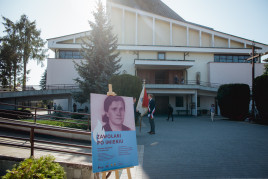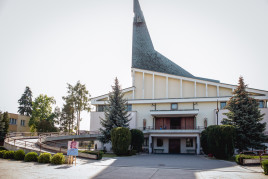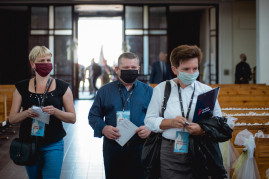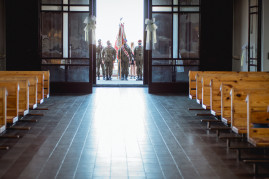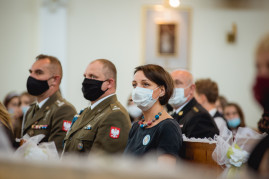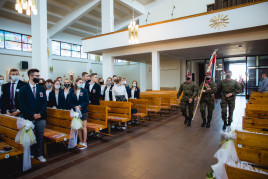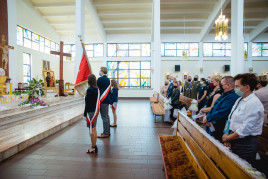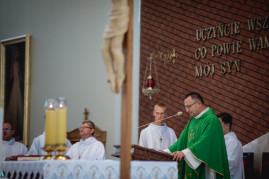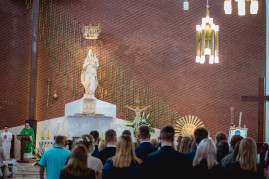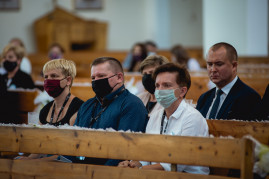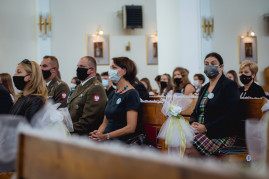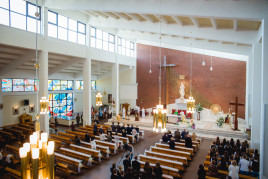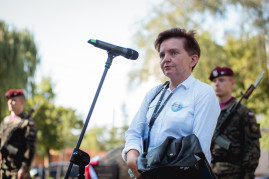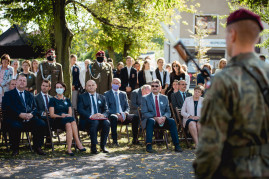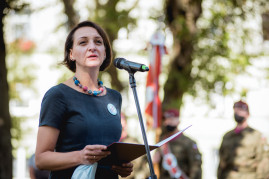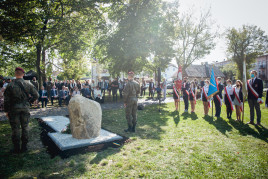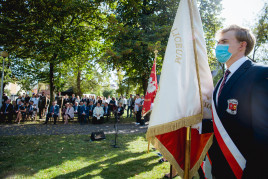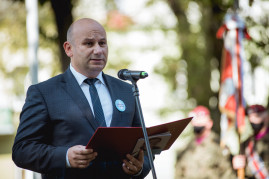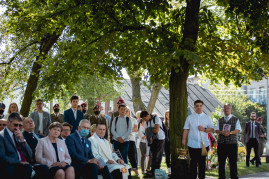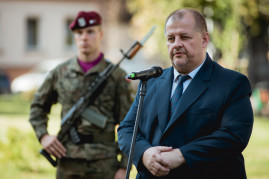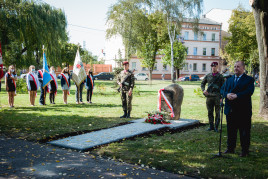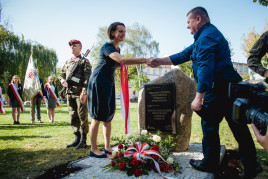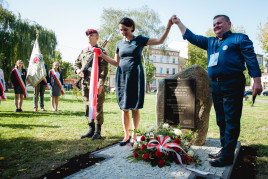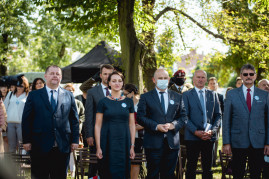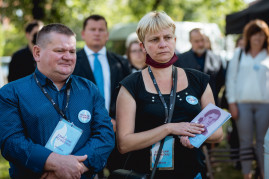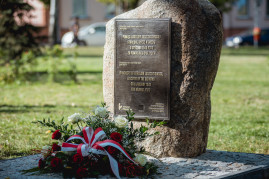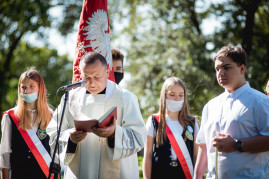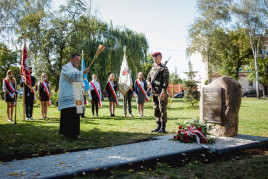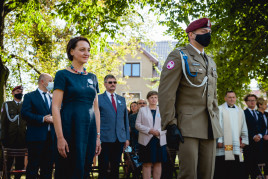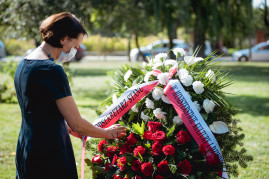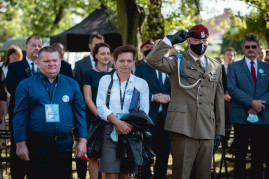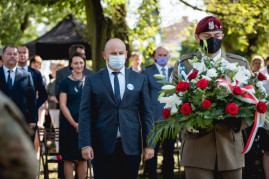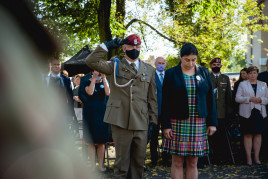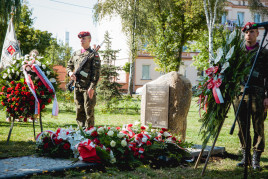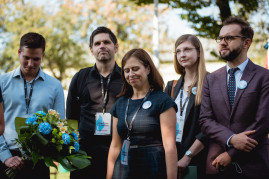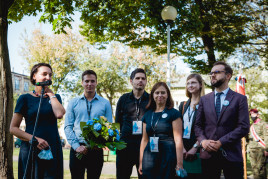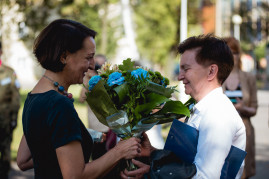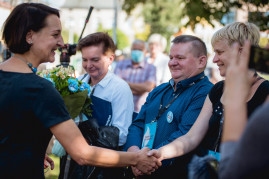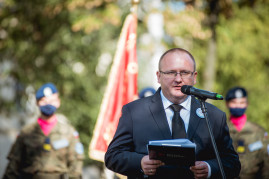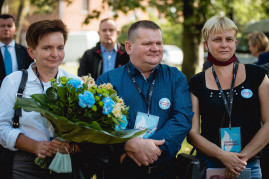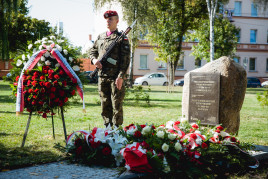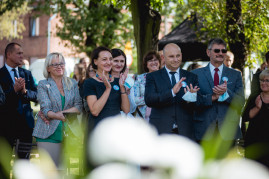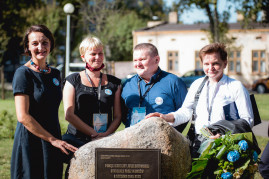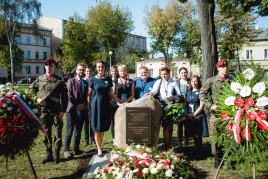A commemoration of Karolina Juszczykowska - Instytut Pileckiego
A commemoration of Karolina Juszczykowska
Karolina Juszczykowska, sentenced to death and executed for hiding Jews during the Second World War, was commemorated in Tomaszów Mazowiecki. This was the 14th commemoration ceremony held as part of the “Called by Name” project.
The event was attended by Prof. Magdalena Gawin, Deputy Minister of Culture and National Heritage; Anna Gutkowska, Deputy Director of the Pilecki Institute; Marcin Witko, Mayor of Tomaszów Mazowiecki; and Mariusz Węgrzynowski, Starost of Tomaszów Mazowiecki. The ceremony began with a Holy Mass in the Parish Church of the Blessed Virgin Mary Queen of Poland, celebrated by Rev. Canon Zygmunt Nitecki.
“The legal system of the Third Reich showed its callousness hidden under the guise of the rule of law in the case of Karolina Juszczykowska,” said Dr. Marcin Panecki of the Pilecki Institute. “Unlike many Poles who rescued Jews, she was not shot on site. She had a trial. The judges who gave her the death sentence asked Hans Frank for clemency immediately afterwards, arguing that ‘the payment of 300 zlotys a week for hiding and feeding the two Jews in the current situation does not constitute an unjustifiably high payment [...] and that the displacement of the Jews can be considered a closed case, so the defendant’s actions cannot be said to have caused any significant harm’. In the end, however, she met with the same fate as the other ‘Called by Name’: ruthless death,” the historian stressed.
“Let children in schools in Tomaszów Mazowiecki learn about Karolina Juszczykowska. Let there be no shortage of flowers at the monument on 24 March, the National Day of Poles who Rescued Jews. If someone gives their life for the innocent, death will undo its sentence. Today we are calling Karolina Juszczykowska by name and revoking her death sentence,” said Prof. Magdalena Gawin, Deputy Minister of Culture and National Heritage and initiator of the “Called by Name” project, before the unveiling of the commemorative plaque.
During the ceremony, a letter by Wojciech Kozłowski, director of the Pilecki Institute, was also read out, referring to the fact that Karolina Juszczykowska was sentenced to death by the court (people helping Jews were usually shot immediately after their “crime” was revealed): “This is the first such case among the ‘Called by Name’. There were many forms of persecution, torture, and murder, because German terror was part of a total war aimed at the total destruction of Poles and Jews. The courage and internal liberty of the ‘Called by Name’ is worthy of commemoration, of our presence and of our reflection. Karolina Juszczykowska deserves our gratitude and our recognition.”
What happened in Tomaszów?
During the German occupation, Karolina Juszczykowska lived in Tomaszów Mazowiecki in a small flat at 30 Niebrowska Street. In the first days of June 1944, when she was coming back from work, she was met by two young men who were unknown to her. Claiming to be local Jews, they asked her for shelter and promised to pay her a modest, regular wage. Juszczykowska’s own difficult financial situation prompted her to look after the fugitives and take them in. Over the course of six weeks, the men slept on the floor and hid in the cellar in times of danger. Their hostess also provided them with food.
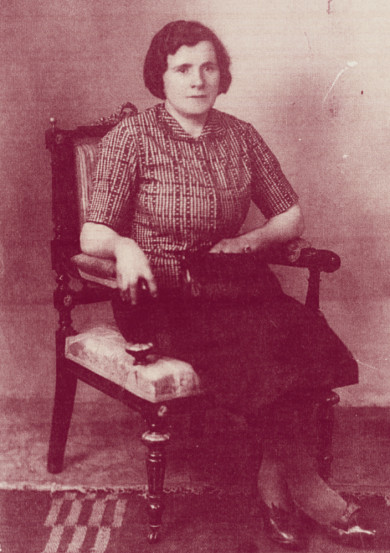
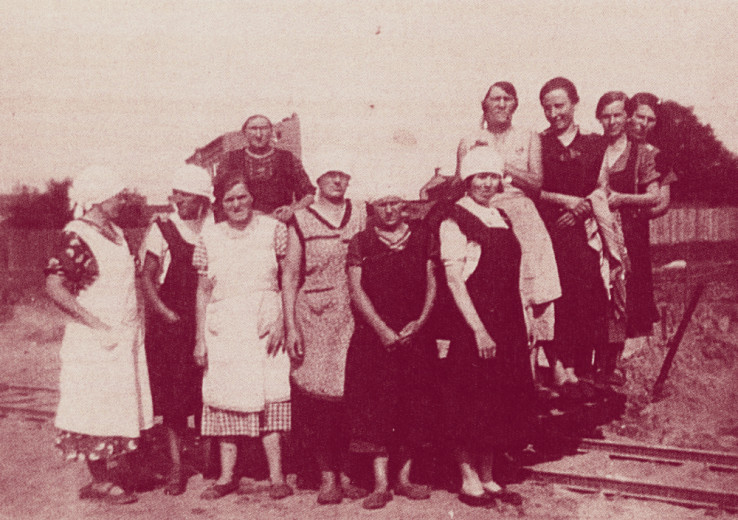
On 23 July 1944, the Germans surrounded the building. They were not looking for anyone in hiding, but had come for a completely different reason. They immediately shot the Jews, whom they discovered by chance in the basement. Karolina Juszczykowska was arrested and put in the police detention center in Tomaszów Mazowiecki. Her daughter, Bronisława, who was in her twenties at the time, was sent for forced labor in Germany. On 10 August, Karolina Juszczykowska was taken to Piotrków Trybunalski, where she awaited trial. On 23 August, the German Special Court sentenced her to death. At the beginning of September, she was transported deep into the Third Reich and imprisoned in the Rodgau-Dieburg POW camp. The death sentence was carried out by guillotine in the Preungesheim prison in Frankfurt am Main on 9 January 1945.
On 17 May 2011, the Yad Vashem Institute awarded Karolina Juszczykowska the title “Righteous Among the Nations”.
The family’s post-war fate
After the war, Bronisława, who was now married, remained in transit camps for displaced persons together with her husband and their two daughters. In 1951, all four of them traveled to Canada, where Karolina Juszczykowska’s only grandson was born soon after. For some time, contact with the grandchildren (Chris Frances, Victoria Gee, Ted Kaczmarczyk) was maintained in Poland by Zygmunt Dziubek, Karolina Juszczykowska’s nephew. After his death in 2014, family relations ceased. Despite many attempts (both by the family and the Pilecki Institute), it has not been possible to re-establish contact with Karolina Juszczykowska’s relatives in Canada.
